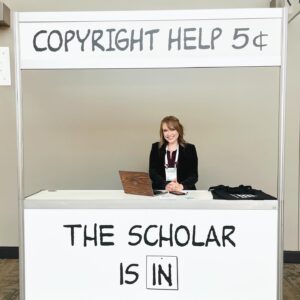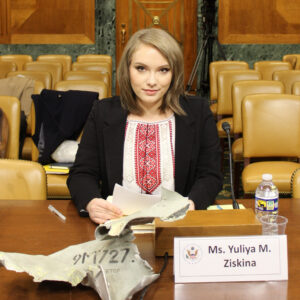In law school, Yuliya Ziskina helped write the playbook on open access advocacy for students. As an attorney, she uses her expertise to push for policies that enable libraries to fulfill their mission to the public. She’s also leveraged her advocacy skills as a global leader on making the case for repurposing Russian state assets to compensate Ukraine.
Ziskina came to the United States from Ukraine when she was 2 years old with her family, who were Jewish refugees from the former Soviet Union. After living in New York and Washington state, she recently moved to Washington, D.C., to be closer to decision-makers on Capitol Hill.
Now, Ziskina is making an impact on several fronts–working on the Internet Archive’s legal policy team, writing legislation affecting libraries for the eBook Study Group, and volunteering with the nonprofit Razom in support of Ukraine.
“I come from a former state where my family grew up without freedoms. So, it’s especially important to me to protect the freedom to learn, to protect our democracy, our institutions’ integrity and transparency,” Ziskina said. “At the core, all of it is based on openness of information and knowledge. If you don’t have access to knowledge, then you can’t participate in society.”
Student advocacy roots
In 2014 when she was a law student at the University of Washington (UW), Ziskina partnered with a library school graduate student, Gennie Gebhart, to lobby for a campus open access policy. [Gebhart is now the managing director of technology at the Electronic Frontier Foundation (EFF).]
“I ran into this issue where I couldn’t access articles I needed. Even being at a big university, many were still paywalled. I thought that was ridiculous,” Ziskina said, “especially for a public institution supported with taxpayer money.”
She and Gebhart drafted a policy proposal and gave it to the library for consideration. Ziskina then joined the Faculty Council on University Libraries as a student representative. Using Harvard University’s Open Access (OA) policy as a model, she worked to revise the proposal and mobilize student support.
“The campaign was about spreading awareness, getting faculty champions, and fighting against misperceptions,” Ziskina said. “I did a lot of research to explain why an [OA policy] was socially beneficial and why there was so much impact that can come from it.”
Ziskina said she learned that university administrators do listen to students and early career researchers, and that librarians are also instrumental to advocacy. In the end, collaboration, perseverance, and patience paid off. Four years after the effort began, UW adopted an OA policy in 2018 and Ziskina co-authored an article about the process.
Ziskini shared her experience at SPARC’s OpenCon gathering for early career researchers in 2015 in Brussels, Belgium. Attendees were very interested in the workshop and wanted to replicate their strategy. She later wrote a policy guide about student OA advocacy for SPARC and the OpenCon Community. An article in the Journal of Librarianship and Scholarly Communication cites the University of Washington OA initiative as an example to other campuses.
At OpenCon, Ziskina said she made connections that have had a lasting influence.
“It’s just a really great community,” Ziskina said. “A huge part of why I’m still doing this work is because of the people at SPARC and around the world who are involved in it. It was inspirational and refreshing to be around people who were dedicated to bettering society, who care about the greater good and about making research and information accessible to everybody who needs it.”
Carving a career path
Ziskina’s interest in copyright law goes back to high school. She liked to sample and remix music, gaining notoriety on the Internet from fans–as well as attention from attorneys at record companies. Ziskina received a “cease and desist” letter demanding she take down the music. In addition to getting grounded by her parents, she said she got mad and started learning about the “fair use” doctrine in copyright law.
At UW, Ziskina studied political science and human rights as an undergraduate and received her law degree with a specialty in intellectual property and international law. She began her professional career as a prosecutor in King County, Washington, focusing on white-collar economic crimes “where people with influence and money take advantage of others,” she said. Ziskina went on to work at the New York City Conflicts of Interest Board, prosecuting ethics violations.
“I think both open and ethics go hand in hand,” she said. “It’s about upholding integrity and transparency, which are the cornerstones of democracy.”
Ziskina next joined a corporate law firm, but said she always hoped to get back into the open world.
Finding opportunity with open causes
In 2022, Ziskina took a one-year position with Library Futures as a policy fellow. There, she said she learned more about community building as another element of advocacy. “It gave me a different perspective. To mobilize communities, you can’t be the only one driving it. It’s a village effort,” she said, noting the strategy that has been employed by librarians impacted by negative ebook bills.

Ziskina staffing a booth and answering copyright questions at the June 2024 American Library Association conference in San Diego.
Ziskina is currently working with copyright expert, Kyle K. Courtney, drafting and advocating for state legislation with the eBook Study Group, a newly established 501{c)4 nonprofit. Their strategy is to introduce bills in as many states as possible to catalyze change in unfair licensing practices–eventually moving to the federal level. Publishers Weekly has written about the issue.
With Library Futures and eBook Study Group, Ziskina has co-written an amicus brief in support of libraries in the Andy Warhol Supreme Court case, as well as amicus briefs in support of the Internet Archive in the Southern District of New York and the 2nd Circuit, representing nine library organizations and 218 individual librarians.
[See a recording of her lecture with Courtney on rightsholder efforts to obstruct the library mission here.]
Ziskina joined the Internet Archive legal policy team in May 2024, where she is playing a leading role in the campaign to secure a National Public Domain Day designation in the U.S. Congress. She also will be promoting the Archive’s forthcoming “Vanishing Culture” report outlining the importance of preservation of cultural artifacts in the digital age.
Fighting to help Ukraine
In between Ziskina’s two part-time jobs in the “open” space and continuing work at a corporate law firm, she’s deeply involved in efforts to help her home country of Ukraine. Volunteering with Razom, she’s traveled twice to Ukraine and authored a crucial legal report, “Multilateral Asset Transfer: A Proposal for Ensuring Reparations for Ukraine,” that established the international and domestic law basis for seizing frozen Russian state sovereign assets to compensate Ukraine.
Ziskina published a piece in Lawfare (“The REPO Act: Confiscating Russian State Assets Consistent With U.S. and International Law“) about a bill in Congress to authorize action related to the confiscation and disposition of Russian sovereign assets. She testified on Capitol Hill in a hearing promoting the REPO Act, showing lawmakers shrapnel from a Russian missile that she brought back from Ukraine to illustrate the urgency of a need for action. [See video of her testimony.]

Testifying before Congress at the U.S. Helsinki Commission hearing, “Making Russia Pay: Sovereign Asset Confiscation for Ukrainian Victory,” in November 2023. She placed a piece of shrapnel from a Russian cruise missile used to destroy a civilian business in Ukraine.
Ziskina has also spoken on this issue at Davos during the World Economic Forum, the United Nations, the Swiss Parliament, and testified at the Council of Europe. Earlier this year, she organized and spoke at an event in the German Parliament, and co-drafted an amendment to the Canadian Special Economic Measures Act to authorize the Canadian government to take similar action.
With friends and family still in Ukraine, Ziskina said she feels compelled to do what she can–especially after visiting the country and experiencing blackouts and nightly air raids up close. “I see it as a responsibility more than anything else,” she said of her Ukrainian advocacy. “To me, it’s not a job. It’s my duty.”
Ziskina said at a time when there is an erosion of human rights globally and a resurgence of populist movements, it’s more important than ever to protect democracy.
“Our democracy starts with available information, and public access to research and knowledge,” she said. “This is the fundamental way that we protect our civil rights and our civil liberties. When that clicks for people, they understand the importance of open and what it means for our entire democratic future.”